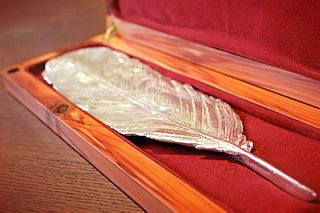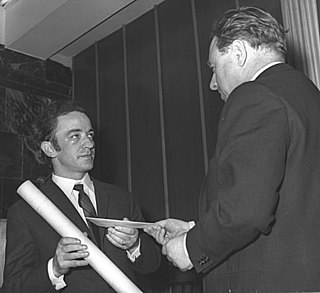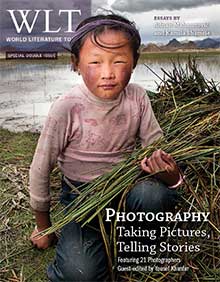Related Research Articles

Bertrand Arthur William Russell, 3rd Earl Russell, was a British mathematician, philosopher, logician, and public intellectual. He had a considerable influence on mathematics, logic, set theory, linguistics, artificial intelligence, cognitive science, computer science, and various areas of analytic philosophy, especially philosophy of mathematics, philosophy of language, epistemology, and metaphysics.

The Nobel Prizes are five separate prizes that, according to Alfred Nobel's will of 1895, are awarded to "those who, during the preceding year, have conferred the greatest benefit to humankind." Alfred Nobel was a Swedish chemist, engineer, and industrialist most famously known for the invention of dynamite. He died in 1896. In his will, he bequeathed all of his "remaining realisable assets" to be used to establish five prizes which became known as "Nobel Prizes". Nobel Prizes were first awarded in 1901.

The Nobel Prize in Physics is a yearly award given by the Royal Swedish Academy of Sciences for those who have made the most outstanding contributions for humankind in the field of physics. It is one of the five Nobel Prizes established by the will of Alfred Nobel in 1895 and awarded since 1901, the others being the Nobel Prize in Chemistry, Nobel Prize in Literature, Nobel Peace Prize, and Nobel Prize in Physiology or Medicine. Physics is traditionally the first award presented in the Nobel Prize ceremony.

The Nobel Prize in Physiology or Medicine is awarded yearly by the Nobel Assembly at the Karolinska Institute for outstanding discoveries in physiology or medicine. The Nobel Prize is not a single prize, but five separate prizes that, according to Alfred Nobel's 1895 will, are awarded "to those who, during the preceding year, have conferred the greatest benefit to humankind". Nobel Prizes are awarded in the fields of Physics, Chemistry, Physiology or Medicine, Literature and Peace.

Ivar Giaever is a Norwegian-American engineer and physicist who shared the Nobel Prize in Physics in 1973 with Leo Esaki and Brian Josephson "for their discoveries regarding tunnelling phenomena in solids". Giaever's share of the prize was specifically for his "experimental discoveries regarding tunnelling phenomena in superconductors".

Brian David Josephson is a Welsh theoretical physicist and professor emeritus of physics at the University of Cambridge. Best known for his pioneering work on superconductivity and quantum tunnelling, he was awarded the Nobel Prize in Physics in 1973 for his prediction of the Josephson effect, made in 1962 when he was a 22-year-old PhD student at Cambridge University. Josephson is the first Welshman to have won a Nobel Prize in Physics. He shared the prize with physicists Leo Esaki and Ivar Giaever, who jointly received half the award for their own work on quantum tunnelling.

The Neustadt International Prize for Literature is a biennial award for literature sponsored by the University of Oklahoma and its international literary publication, World Literature Today. It is considered one of the more prestigious international literary prizes, often compared with the Nobel Prize in Literature. The New York Times called the prize “The Oklahoma Nobel” in 1982 and the prize is sometimes referred to as the “American Nobel”. Since it was founded in 1970, some 30 of its laureates, candidates, or jurors have also been awarded Nobel Prizes. Like the Nobel, it is awarded to individuals for their entire body of work, not for a single one.

The Jerusalem Prize for the Freedom of the Individual in Society is a biennial literary award given to writers whose works have dealt with themes of human freedom in society.

World Literature Today (WLT) is an American magazine of international literature and culture, published at the University of Oklahoma. The magazine's stated goal is to publish international essays, poetry, fiction, interviews, and book reviews for a non-academic audience. It was founded under the name Books Abroad in 1927 by Roy Temple House, a professor at the University of Oklahoma. In January 1977, the journal assumed its present name, World Literature Today.

The Nobel Prize in Literature is a Swedish literature prize that is awarded annually, since 1901, to an author from any country who has, in the words of the will of Swedish industrialist Alfred Nobel, "in the field of literature, produced the most outstanding work in an idealistic direction". Though individual works are sometimes cited as being particularly noteworthy, the award is based on an author's body of work as a whole. The Swedish Academy decides who, if anyone, will receive the prize. The academy announces the name of the laureate in early October. It is one of the five Nobel Prizes established by the will of Alfred Nobel in 1895. Literature is traditionally the final award presented at the Nobel Prize ceremony. On some occasions, the award has been postponed to the following year, most recently in 2018 as of July 2023.

The Nobel Memorial Prize in Economic Sciences, officially the Sveriges Riksbank Prize in Economic Sciences in Memory of Alfred Nobel, is an economics award administered by the Nobel Foundation.

The Nobel Prize in Chemistry is awarded annually by the Royal Swedish Academy of Sciences to scientists in the various fields of chemistry. It is one of the five Nobel Prizes established by the will of Alfred Nobel in 1895, awarded for outstanding contributions in chemistry, physics, literature, peace, and physiology or medicine. This award is administered by the Nobel Foundation, and awarded by the Royal Swedish Academy of Sciences on proposal of the Nobel Committee for Chemistry which consists of five members elected by the Academy. The award is presented in Stockholm at an annual ceremony on 10 December, the anniversary of Nobel's death.
References
- 1 2 Previous Welsh Nobel Prize winners Wales Online. URL referred 5 September 2010
- ↑ Nobel Prize literature laureates Nobel Prize Foundation web site. URL referred 5 September 2010
- ↑ Whitman, Alden (3 February 1970). "Bertrand Russell obituary". New York Times.
